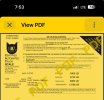I just purchased a new 2025 Ram 1500 Big Horn ,3.0 Hurricane 6’4” bed 3.92 gears.
I’m looking at the Jayco but thinking it might be too much tongue weight. They list it at 745. My max cargo is 1525lb my family plus bed cover and hitch is about 925lb thoughts??
Sent from my iPhone using Tapatalk
I’m looking at the Jayco but thinking it might be too much tongue weight. They list it at 745. My max cargo is 1525lb my family plus bed cover and hitch is about 925lb thoughts??
Sent from my iPhone using Tapatalk












